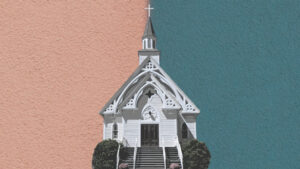Five years ago, I would have been embarrassed to say I was a Christian here at the University of Oxford.
When I started my master’s program, I came mentally prepared for the ridicule I’d been told Christians inevitably receive in academia. I even read historian Tom Holland’s Dominion to arm myself with positive moments in Christian history, ready to face the gauntlet of accusations about colonialism, imperialism, and misogyny. To my surprise, I encountered a far different posture toward my religious beliefs.
Instead of aggressive antagonism, I experienced unexpected spiritual openness from my friends and classmates. While this thousand-year-old institution houses a highly secular and progressive student body, its architecture can’t help but subtly remind inhabitants of its deeply religious heritage. The cultural mood might just be shifting. Conversations about faith, once taboo or marginal, now feel relevant. Over this last year, it seems that religion has become a trendy topic for lively discussions at seminars, lectures, and pub chats around the city.
Justin Brierley has taken the Christian internet by storm with his recent book and podcast series titled The Surprising Rebirth of Belief in God. His proposition thunders: Maybe our doom-and-gloom predictions about secular society have been misdirected. Brierley charts the fall of the New Atheism movement and the migration of public intellectuals toward Christianity, noting how some have professed belief in Christ while others laud Christianity’s cultural benefits. Suddenly, Christianity seems like an intelligent option, especially amid the West’s frantic search for what cultural story it should cling to as secular narratives collapse around us.
While the renewed interest in the transcendent at Oxford certainly includes the vast swath of undergrads inspired by TikTok spirituality or those walking with crystals around their necks and tarot cards in their pockets, there’s a noteworthy turn toward organized religion as well. Here are some back-of-the-napkin notes I’ve taken on the renewed interest in God on the ground at Oxford, divided into two categories: cultural and spiritual.
Cultural Variables
Distrust of Institutions
At a recent gathering with friends from across the globe, I asked, “Is there any institution you still trust?” The unanimous answer: no. Governments, the United Nations, the media, corporations, NGOs, even democracy—all were met with cynicism. A thick cloud of disillusionment has settled over my generation about “the Establishment,” creating a sense there’s nowhere left to turn for institutional direction or infrastructure to bring about positive societal change.
This phenomenon may be one reason Oxford students are willing to give religion another shot. If the suite of modern institutions forged in post–World War II optimism—developed to deliver human rights and prosperity to us on a platter—has so deeply failed us, should we go back to something older? Maybe people are hungry to be guided by more transcendent principles instead of man-made institutions vulnerable to cultural conditions and corruption.
If the suite of modern institutions forged in post–World War II optimism has so deeply failed us, should we go back to something older?
As G. K. Chesterton wrote in Orthodoxy, we’re always “rushing” around to create our own systems, only to turn and find Christianity with the solution, “sitting up there in the sunlight, shining, and a thousand years old.” Could it be that a return to ancient truths offers the stability our modern institutions have failed to provide?
Longing for Community
Several of my nonreligious friends who were curious about my church have asked to tag along with me. Each time, they voiced the same surprise: “This many young people go to church nowadays?” Instead of a deadbeat service acting as merely a cultural relic, they found a bustling room full of several hundred people, many younger than 30. They admire the web of friendships that burgeoned from my church community, hemming me in like a family and easing the adjustment period into this new city.
In a world where a loneliness epidemic is being continually diagnosed due to technology, urban planning, and what Simone Weil calls a modern malaise of “uprootedness,” many young professionals and students feel isolated and uncertain of how to make friends in a new city. Suddenly, the church has a warm, homey glow about it. One of my friends who walked away from Christianity recently admitted how much she misses this sense of familiarity, this band of people ready to embrace you. While we can defend Christian doctrines, embodied experience remains a powerful tool of persuasion. The church’s concrete invitation into communal life—to the table, the altar, the potluck, the nativity play, the choir—answers a culture-wide longing sharpened by the individualism of modern society.
Bolstering of Western Civilization
The West—its core values, history, and identity—seems fragile. Brierley points to the train of public intellectuals who have professed faith in recent years. With prominent atheist Richard Dawkins coming out as a “cultural Christian,” we see a cluster of thinkers equating Christianity with Western civilization, trying to strengthen the latter in its weakened state.
Yet the mechanisms of religious belief are multifaceted. While we hope some of these thinkers are having real encounters with God, it’s also important to keep tabs on their motivations––especially with the emerging trend of ‘civilizational Christianity‘. The instrumentalizing of Christianity for cultural restoration or political agendas has caused many a bloody war in history. There’s a difference between Christianity and Christendom. While Dominion makes a convincing case that Western values are rooted in Christian foundations, the reverse isn’t true. Christianity doesn’t depend on Western civilization—and indeed is flowering throughout the Global South.
Spiritual Variables
Haunted by Secularism
Charles Taylor famously described our age as mutually “haunted”: believers wrestle with doubt, while nonbelievers are plagued by the transcendent. Many people in my generation have grown up in atheist households without exposure to religious communities or spiritual teachings. Being locked inside the “immanent frame” (Taylor’s term for a worldview limited to the natural world) their whole lives, they suddenly see the supernatural as edgy and even appealing.
C. S. Lewis’s concept of Sehnsucht, or the German word denoting the longing for joy, becomes a useful tool here. These moments when the transcendent breaks in, offering a powerful sense that there is a spiritual realm, can serve as gateways to faith in God. In my conversations, even staunch skeptics light up when asked if they’ve ever experienced one of these unexplainable moments of wonder. When you’ve grown up in a cold, closed, and calculable universe, you don’t forget the memory of any spiritual winds that have blown through you. In a recent article, Brierley quotes Holland saying, “The moment you accept there are angels, the world just seems richer and more interesting.”
Desiring Moral Structure and Emotional Support
When chatting about my faith at the pub, I’ve encountered the same response several times: “You know, I’m actually a bit jealous.” One friend mentioned her underlying anxiety, the general feeling of despair due to the future’s unknowns. Having a religious faith, some sort of trellis on which to build your emotional and moral life, sounds less tiring than conjuring your own beliefs and ethical systems. The anxiety that has become a trademark of our generation is only aggravated by the moral uncertainty of our times.
In an age of dating apps, polyamory, and porn, many young people are exhausted by the burden of self-made morality. Through their research, Louise Perry, Mary Harrington, and other reactionary feminists have argued that the ambiguity of modern sexual norms makes young women especially unhappy and can fail to protect the vulnerable. The word “sin” creeps in as a relief, a concrete way to label something right or wrong and to constrain behavior. Suddenly, a moral system like Christianity, meant to produce virtuous, wise, and respectful individuals, may not seem so stifling or oppressive anymore.
From Head to Heart
If the culture’s questions are changing, so too should our apologetics. While rational apologetics remains vital, we’re witnessing a shift in emphasis between generations. At a recent stay at the English L’Abri, I noticed that older attendees were wrestling with questions of faith and reason, asking, Can I trust the accuracy of the Bible? Is God’s existence provable? Younger attendees, by contrast, were exploring Christianity’s effects on their everyday experiences.
In an age of dating apps, polyamory, and porn, many young people are exhausted by the burden of self-made morality.
While my nonreligious friends here in Oxford are still curious about how I make sense of Christianity’s history of colonialism or how I rationalize its creeds, they seem more intrigued by how my faith orients my life, purpose, and emotional world. This shift from “Is it true?” to “Does it work?” reflects a broader cultural change that the church should mindfully prepare to engage.
New Openness
Today, I’m not embarrassed to be a Christian at Oxford, a highly secular and progressive institution in a post-Christian country. The above cultural and spiritual variables have created a context where spiritual conversations come up with ease. There’s no awkward or unnatural steering toward these topics. Instead, it’s as if people can’t help but bring them up.
Of course, Oxford is unique. Some of these factors may be attributable to its environment, which attracts minds ready to discuss big questions. My experience is also colored by being at the intersection of the social sciences and humanities—I’ve heard the old guard of atheism and naturalism often still stands in STEM circles. While America and England are different contexts, I believe there’s still something afoot.
Australian pastor and thinker Mark Sayers has been suggesting that a season of renewal and revival may be upon us and imploring the church to be ready. From where I sit in Oxford, I can’t help but tingle with excitement that Brierley just might be right—there really might be a surprising rebirth of the belief in God.
Consider Jesus’s Generous Grace with This Free Ebook
 John the Baptist. Judas. Zaccheus. Caiaphas. We could quickly label these individuals as heroes or villains—but each of their experiences with Jesus provides a unique and unexpected glimpse of his generous grace. What might we have overlooked in their familiar stories?
John the Baptist. Judas. Zaccheus. Caiaphas. We could quickly label these individuals as heroes or villains—but each of their experiences with Jesus provides a unique and unexpected glimpse of his generous grace. What might we have overlooked in their familiar stories?
In Saints and Scoundrels in the Story of Jesus, seasoned bible teacher Nancy Guthrie provides readers with a fresh look at some of the most well-known personalities described in the Gospels.
We’re delighted to offer this ebook to you for FREE today. Follow the link for instant access to a resource that reminds us of the only hope for supposed saints and scandalous scoundrels—the mercy of God






























